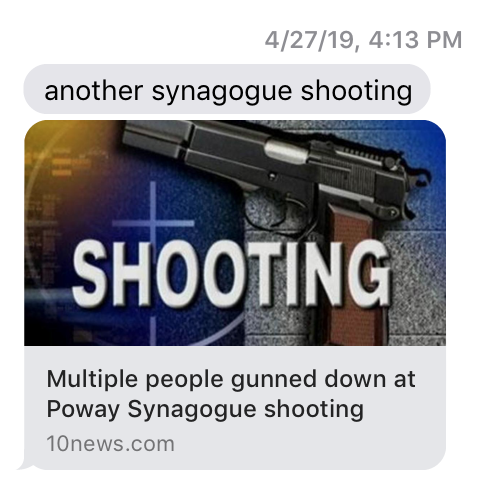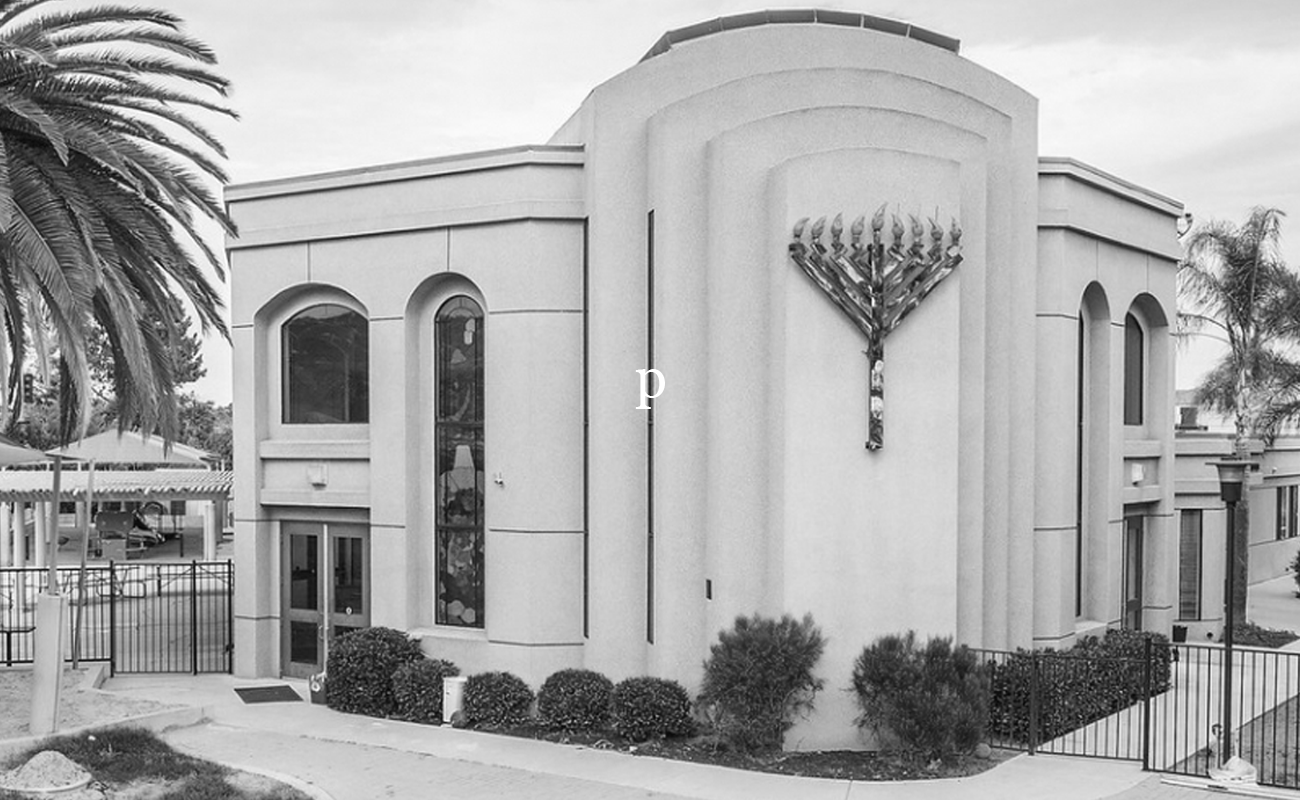“Another syngagoue shooting.” That’s the text I got Saturday afternoon, as I was out with friends celebrating a birthday:
“Another synagogue shooting.”
My heart dropped but I wasn’t surprised. I was immediately thrown back to another Saturday, six months ago, when news of Pittsburgh starting breaking through. Another. How much has this been normalized? How do we feel anything but numb? Or angry or sad or hopeless? How do we react to another synagogue shooting, six months to the day after the Pittsburgh synagogue shooting?
On slack Monday morning, I gathered three other members of Team Alma — Molly Tolsky, editor, Arielle Kaplan, editorial assistant, and Lior Zaltzman, contributing writer — to come together to process how we’re feeling. Below is our conversation, lightly edited. (And I’m Emily Burack, another editorial assistant, the questions are also from me.)
* * *
Okay. Where were you when you found out about Poway? How did you react?
Lior: I was trying to take a nap… which didn’t happen obviously.
Molly: I was at home, just hanging out with my boyfriend. I first saw it on Twitter and didn’t even say anything, I think because I didn’t want it to be real. Ten minutes later when I saw another report come out about it, I finally said out loud, “There’s been another synagogue shooting.” We reluctantly turned on CNN. I honestly just felt like, “No.” Just, “Please don’t be real. Please nobody die. I don’t want to deal with it.”
Arielle: I was in a Starbucks doing some work when I got a notification from the Washington Post: “We tried 15 of the most popular frozen pizzas and ranked them” at the exact same time as I got a text from my brother: “synagogue shooting in San Diego.” My initial reaction was, “What the actual fuck, WaPo?” and my second reaction: “not again….”
Was your gut feeling “this is Pittsburgh again”?
Molly: At first I really, really wanted to believe it wasn’t. I was hoping it was some sort of domestic dispute, or bad reporting, or something else. I really didn’t want to believe it. But I also think, deep down, I knew what it was.
Lior: Yes, I mean, especially because of the Shabbat thing. I know it makes sense because it’s when people are at shul, DUH, but something about these things happening on Shabbat feels so vulnerable.
Arielle: Initially I’ll admit I wasn’t as horrified as I was when I first heard about Pittsburgh. But when I started seeing tweets about the shooting having occurred exactly six months after and all the heartbreaking details, I had flashbacks of being at the Pittsburgh funerals and that’s when my heart broke.
Molly: Once I realized it was six months to the day, I started to feel like this was much more deliberate and terrifying.
Emily: And adding on to that six month thing, the shooter was supposedly inspired by the mosque shooting in New Zealand. It just scares me how much media attention the shooters get — and how much people want to copy it. I wish I didn’t know his name. Or his face. Or anything.
Arielle: I don’t know his name and I don’t want to know anything about him.
Lior: When I stared seeing articles with his name, I was like, wait, why are we doing this?
Should our coverage of these terrible, terrible shootings shift?
Molly: I think about that — like publishing his “manifesto” — is that a good idea? For others to see that? At the same time if this happened and the media didn’t cover it, people would lose their minds.
Lior: To know that he was this smart kid with a great GPA, who does it help? The framing is still so, oh no, a poor lost soul, he was 19, but no. He was a killer, he shouldn’t get publicity.
Do you feel like we move on too quickly?
Emily: I felt like people moved on too quickly after Pittsburgh. I felt like we were all living in it for so long when it felt like the world forgot, and regarding Poway, that “moving on” felt nearly immediate.
Molly: I agree, but I think that goes for any mass tragedy where you have a closer connection to it. You’ll be thinking/caring about it a lot longer than others. But, yes, Poway has been even quicker. Even for myself, though. I’m not wallowing as much as I was after Pittsburgh.
Is it because we’re used to it?
Molly: I think Pittsburgh really broke me. It was the first of its kind, at least during my lifetime, and it sort of opened the floodgates. When Poway happened, I was like, I’ve already given all my grief and mourning and anger to Pittsburgh. I’ve got nothing left.
Lior: I mean, Pittsburgh was historical, and stunning.
Arielle: I felt a little guilty about how enraged and heartbroken I am about Poway, because I didn’t have nearly that energy for Chirstchurch — because I didn’t have that connection.
Lior: Yeah, I feel that Arielle. I was really enraged about both, and so heartbroken, but I felt weird tweeting about Poway now when I didn’t tweet about Christchurch.
Emily: But — we are American Jews. (Or, Lior, you’re now a Jew in America.) Of course we’re going to feel things about an American synagogue versus a mosque in New Zealand? I don’t know…
Molly: Right, I think that’s very natural and normal. I also really hate this idea that because you didn’t tweet about something, you don’t care about it.
On the note of Twitter: What about the “politicization” of it all? Like, how quickly people used Poway for their own viewpoints.
Lior: I think that’s maybe why I haven’t been as engaged with it on Twitter, because people were making it about their brand of anti-Semitism that bothers them the most.
Molly: What bothered me the most was how quickly Jews starting fighting with each other on Twitter. It’s so upsetting. We’re obviously all grieving, and none of this fighting is helping.
Arielle: I have controversial opinions, but I don’t want to ruffle feathers and fight with Jews. This is a time to be comforting each other and strengthening our community that’s starting to crack.
Lior: Like, that cartoon in the NYT that was awful, but some people were directly correlating that with Poway.
Molly: Yes, that was ridic! Like this kid saw a cartoon from the *international* New York Times that day and immediately was inspired? Or the people blaming Ilhan Omar, my God.
Lior: In a weird way it reminded me of Chelsea Clinton getting attacked after Christchurch. I don’t think any of these things are directly correlated, I don’t think the Christchurch shooter was inspired by Chelsea Clinton or that the NYT cartoon was related to the Poway attack.
Emily: I feel like, though… I also fell into the politicization on Twitter. I just checked and I RT’d two things, both are which are “political.”
Molly: I think it’s totally fine to be political. This is political!!!
Lior: Yeah, I probably did too!
Emily: I feel like my identity as a Jewish person is political. And I hate that.
Okay, last question. What’s next? What do we do, as members of the “Jewish media” and as Jews in America? How do we move forward?
Arielle: We do what we did following Pittsburgh — we strengthen our community and we become louder and prouder of who we are. Hiding is what anti-Semites want and we’ll never give that to them. I am so fucking proud to be Jewish. Every time a tragedy like this happens I feel even prouder. It’s such an odd simultaneous juxtaposition of feelings: heartbreak and pride.
Lior: That feels like a big question, what does moving forward mean? Obviously, as every attack happens, Jewish institutions learn more about keeping safe. I think what we should take away from this is that white supremacy is dangerous and fatal. And that it’s not different from any other force that killed Jews through the ages. That it was always about some perceived notion that we were different and other and threatening and trying to take something from the majority. I have a really hard time with this as an Israeli person who is trying to become American… My family used to be the other. Then we were in Israel, where we were the majority, and now I am the other again. I like being a Jew in America, though. I think there’s a lot of freedom with how open and diverse Judaism is here. I’m proud to be a Jewish person in America and how it’s made me rethink my own identity as a Jew… But also, I hate that this historical hate, which reminds me too much of the forces that killed my grandparents’ families, is rearing its head here in this way.
Molly: I think, for one, we keep living. We keep doing what we want to do. We keep publishing silly articles about Jewish pop culture and make funny Jewish memes and not let tragedies like this make it so we can’t have fun and celebrate who we are. One of my first reactions to the shooting was, “Ugh, now I have to rearrange our schedule and not publish certain pieces for a little bit” which pissed me off. And then I felt really guilty about that, because obviously that is SO NOT THE ISSUE here, people are losing their lives. But after thinking about it some more, I do think it’s important we don’t let this stop our regular lives. We have to keep moving forward, keep seeking out the things that bring us joy. And at the same time, we continue to talk about it. We don’t move on from it as quickly as everyone else. We amplify Jewish voices and make our fears and concerns known.
[pause]
Molly: And we vote!!



